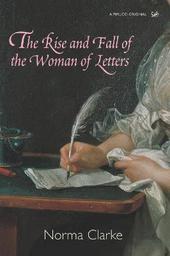
|
The Rise and Fall of the Woman of Letters
Paperback / softback
Main Details
| Title |
The Rise and Fall of the Woman of Letters
|
| Authors and Contributors |
By (author) Norma Clarke
|
| Physical Properties |
| Format:Paperback / softback | | Pages:400 | | Dimensions(mm): Height 234,Width 153 |
|
| Category/Genre | Literary studies - c 1500 to c 1800
Literary studies - fiction, novelists and prose writers |
|---|
| ISBN/Barcode |
9780712664677
|
| Classifications | Dewey:820.9928709033 |
|---|
| Audience | | General | | Tertiary Education (US: College) | | Professional & Vocational | |
|---|
|
Publishing Details |
| Publisher |
Vintage
|
| Imprint |
Pimlico
|
| Publication Date |
27 May 2004 |
| Publication Country |
United Kingdom
|
Description
In the mid-eighteenth-century, the achievements of cultivated, literary women - as poets, critics, dramatists, scholars, and polemicists - were widely celebrated. By the beginning of the nineteenth-century, however, they had all but disappeared. Following a chronological line from the beginning of the eighteenth-century to the end, The Rise and Fall of the Woman of Letters is a study of Elizabeth Singer Rowe, Elizabeth Carter, Hester Chapone, Mrs Montagu, Anna Seward, and Joanna Baillie and other women who took on the role of public writers in the age of rapidly evolving print culture. Precocious, witty, learned, and confident, the eighteenth-century woman of letters was a cultural figure who was invited to think and speak with authority. Her voice was listened to on equal terms with men and she derived her confidence from the approval of a culture undergoing dramatic social and political change. By the turn of the century, however, definitions of feminity had changed and despite huge advancements in the publishing industry, the type of literary woman sanctioned then and mythologised in our own times, was secretive and troubled about daring to write, publishing mostly fiction and poetry - internalised and 'private' forms of discourse - under pseudonyms. Through an examination of the literary texts produced by the 'Bluestockings' and an analysis of the cultural and social changes surrounding the production of theses materials, Clarke looks closely at how the eighteenth-century woman of letters became such an important part of public life and accounts for why she disappeared.
Author Biography
Educated at the Universities of Lancaster, London, and Kent, Norma Clarke is a Research Fellow in the English Department, Kingston University, and an Honorary Research Fellow in the History Department, Royal Holloway College, University of London. She is the author of five novels for children, numerous articles and several books, including Ambitious Heights (1990) and, with Helen Weinstein, Spinning with the Brain (1996).
ReviewsA book of subtlety and distinction, a reminder of just how far feminist literary scholarship has come * Guardian * This book achieves far more than the rehabilitation of forgotten authors... Instead, she investigates the broader mechanisms of fame, the formation of authorial personae, and the mysterious reasons why some names rise while others fall...This is a subtle, persuasive and engrossing study * Independent * Inspirational...reveals a rich history of literary women who not only made a living from writing but were treated as the equals of their male peers... [It] should be a set textbook in English classes * Herald *
|